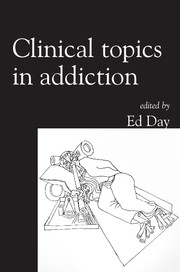Book contents
- Frontmatter
- Contents
- List of tables
- List of boxes
- List of figures
- List of contributors
- Foreword by Nat Wright
- Preface
- 1 What works in drug addiction?
- 2 The development of the drug treatment system in England
- 3 Stimulant use still going strong
- 4 Adverse effects of khat: a review
- 5 What the clinician needs to know about magic mushrooms
- 6 What works in alcohol use disorders?
- 7 Management of alcohol detoxification
- 8 Nicotine addiction and smoking cessation treatments
- 9 Pathological gambling: an overview of assessment and treatment
- 10 Use of investigations in the diagnosis and management of alcohol use disorders
- 11 Laboratory investigations for assessment and management of drug problems
- 12 Pharmacotherapy in dual diagnosis
- 13 Dual diagnosis: management within a psychosocial context
- 14 Treating depression complicated by substance misuse
- 15 Treating anxiety complicated by substance misuse
- 16 An overview of psychological interventions for addictive behaviours
- 17 Motivational interviewing
- 18 Substance misuse in adolescents
- 19 Management of drug misuse in pregnancy
- 20 Intoxication and legal defences
- 21 Substance misuse and violence: the scope and limitations of forensic psychiatry's role
- 22 Literary and biographical perspectives on substance use
- Index
12 - Pharmacotherapy in dual diagnosis
Published online by Cambridge University Press: 02 January 2018
- Frontmatter
- Contents
- List of tables
- List of boxes
- List of figures
- List of contributors
- Foreword by Nat Wright
- Preface
- 1 What works in drug addiction?
- 2 The development of the drug treatment system in England
- 3 Stimulant use still going strong
- 4 Adverse effects of khat: a review
- 5 What the clinician needs to know about magic mushrooms
- 6 What works in alcohol use disorders?
- 7 Management of alcohol detoxification
- 8 Nicotine addiction and smoking cessation treatments
- 9 Pathological gambling: an overview of assessment and treatment
- 10 Use of investigations in the diagnosis and management of alcohol use disorders
- 11 Laboratory investigations for assessment and management of drug problems
- 12 Pharmacotherapy in dual diagnosis
- 13 Dual diagnosis: management within a psychosocial context
- 14 Treating depression complicated by substance misuse
- 15 Treating anxiety complicated by substance misuse
- 16 An overview of psychological interventions for addictive behaviours
- 17 Motivational interviewing
- 18 Substance misuse in adolescents
- 19 Management of drug misuse in pregnancy
- 20 Intoxication and legal defences
- 21 Substance misuse and violence: the scope and limitations of forensic psychiatry's role
- 22 Literary and biographical perspectives on substance use
- Index
Summary
Summary The prevalence of coexisting substance misuse and psychiatric disorder (dual diagnosis, comorbidity) has increased over the past decade, and the indications are that it will continue to rise. There have simultaneously been unprecedented developments in the pharmacological treatment of alcohol, opiate and nicotine misuse. Here we evaluate the evidence on the use of some of these treatments in dual diagnosis (with psychotic, mood and anxiety disorders). The evidence base is limited by the exclusion of mental illness when pharmacological agents for substance misuse are evaluated and vice versa. We set the available information within the context of the psychosocial management of comorbid substance misuse and mental illness, and the framework for service delivery recommended by UK national policy.
In 1980, Robin Murray raised the question ‘Why are the drug companies so disinterested in alcoholism?’ (Murray, 1980). Since then, we have witnessed the evolution of a ‘specialist addiction field’ (Edwards, 2002), including rapid developments in pharmacological treatments for problem use of alcohol, opiates and nicotine. In this review we discuss some of these pharmacological agents and then summarise the evidence on the treatment of combined or coexisting disorders, also described as ‘dual diagnosis’ (e.g. Banerjee et al, 2002; Crawford et al, 2003).
Dual diagnosis: a definition (see also chapter 13)
‘Dual diagnosis’ is one of a number of terms and phrases (Box 12.1) used to refer to people who have coexisting problems of mental disorder and substance misuse (including alcohol, nicotine and illicit drugs). It is also applied to people with two coexisting conditions, for example learning disability and mental disorder (Banerjee et al, 2002), although it does not take that meaning in this chapter.
The group of people with dual diagnosis is heterogeneous, with complex, changing needs. They may have had previous traumatic experiences such as childhood sexual abuse, bullying at school or a broken and dysfunctional family life. Furthermore, mental disorder and substance misuse sit on separate dimensions, each with its own continuum of severity. ‘Dual diagnosis’ covers someone with bipolar disorder who is also alcohol dependent, and someone who has schizophrenia and smokes cannabis a few times a week. As a result of this complexity, numerous operational definitions may be applied in different clinical and social settings, thus complicating and confusing communication.
- Type
- Chapter
- Information
- Clinical Topics in Addiction , pp. 149 - 168Publisher: Royal College of PsychiatristsPrint publication year: 2007



